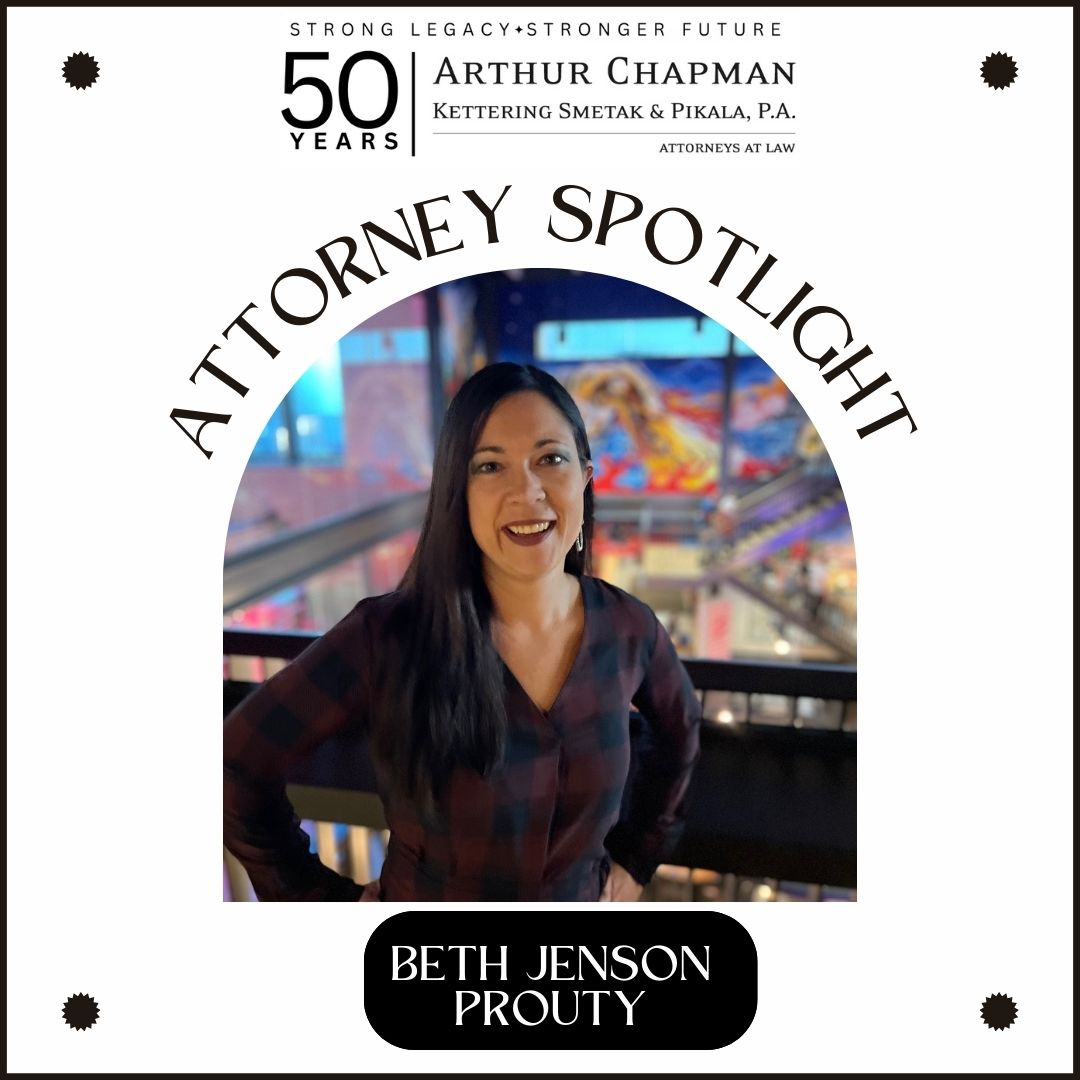It is our firm's 50th anniversary year and we are highlighting attorneys that play an important role in our firm's success. Today, we introduce you to Beth Jenson Prouty.
What inspired you to become an attorney, and how did you choose your specific field of law?
After law school, I clerked for the Minnesota Supreme Court for a year and then went to Arthur Chapman. I focused on writing complex motions and appeals across a variety of practice areas. One day, the firm was hiring for its Insurance Coverage Group. It initially didn’t even occur to me to apply until a partner sold me on the group, telling me it would fit my skill set of research, writing, and appeals. He was right! I hit the ground running with two appeals to the Minnesota Court of Appeals and one to the Eighth Circuit in my first year of coverage work.
Over the past 14 years, I’ve handled multiple appeals before the Eighth Circuit and the Minnesota Supreme Court and Court of Appeals.
What are some of your favorite cases to work on?
My first coverage appeal is still one of my favorite. In the case, the liability claim alleged that the fertilizer the insured sold did not produce the quantity of corn that the insured said it would. There was no claim that the fertilizer harmed the crop so that it produced less than it would have if no fertilizer had been applied. Rather, the claim was that the fertilizer failed to enhance the production of the corn crop to its anticipated yield. The Minnesota Court of Appeals held the claim was not covered as it did not allege “property damage.”
Another recent highlight was arguing before the Minnesota Court of Appeals on the issue of whether claims for COVID business interruption coverage can allege “direct physical loss or damage.” Other courts have almost uniformly held that it does not, but it was an issue of first impression for Minnesota appellate courts. The Court of Appeals held that a claim that COVID was “likely” on the premises – without any evidence that it was “actually” on the premises – was not sufficient to survive a motion to dismiss. The “likelihood” of something present cannot cause “direct physical loss or damage.”
Another recent Eighth Circuit case involved application of the catch-all provisions to the Violation of Statutes Exclusion. On appeal from the District of North Dakota, the Eighth Circuit held the exclusion applied to preclude coverage for both the FDCPA claims and the common law claims, because they all arose out of the same set of facts.
What is your favorite part about being a Coverage Attorney?
I like coverage work because it is like solving a puzzle. Generally speaking, you apply the facts alleged in the liability complaint to the terms in the insurance policy, research for case law guidance, and then fit it all together to decide if a claim could be covered by the policy or not. If there is any question about coverage, you reserve rights and consider whether to start a dec action. If coverage is clearly precluded, you deny coverage and consider whether to start a dec action. (The specific process may vary from state to state.) It is all very logical and fact driven. And most often coverage cases are decided on summary judgment as a matter of law. There might be a disagreement about how the law applies, but everyone knows what the potential outcomes will be and can evaluate potential exposures if they lose their respective positions. In contrast, I also do some trucking and auto work, and in those cases you are always trying to evaluate what a jury would award for bodily injury and emotional distress. There is no set calculation to determine this. In coverage, there is.
I also like that every coverage case has its own different facts. So even if you are dealing with the same policy provision, coverage might turn out differently depending on the unique twists and turns in the case. Also, there are so many different types of policies and different coverage forms within the different types of policies. So you never can take anything for granted. You are always learning.
How do you maintain a healthy work-life balance in the demanding field of law?
Work-life balance is really important to me. As lawyers, we work a lot. But especially once I had kids, I made it a point to think about how I could stay in the practice long-term and still find the time I needed for the things that matter most to me, like my family. It is different for everyone. I am also a fan of exercise and hiking. Not only does it help me handle stress and refocus, I find that the physical challenges I overcome make me better equipped to face challenging elsewhere.



